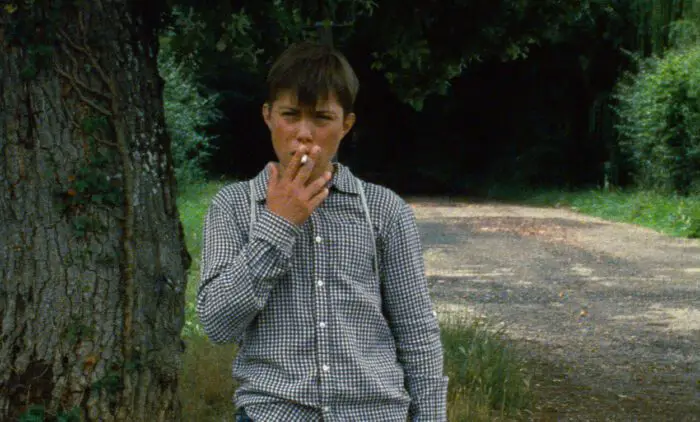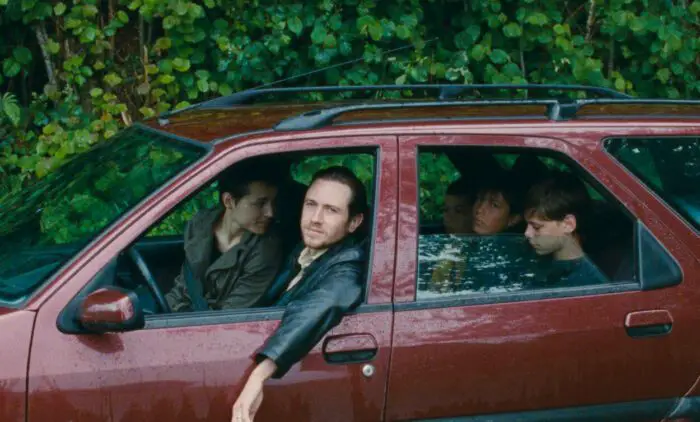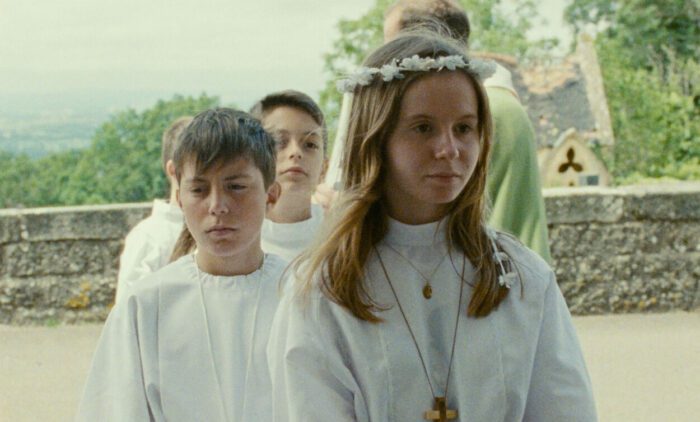Director-writer David Depesseville’s debut feature film Astrakan is a film of both mesmerizing beauty and emotional intensity, with a cast whose performances are raw and compelling. It is also a film with an obliquely told story that plays just a bit coy with narrative facts as it crescendos towards its literally operatic conclusion, one viewers may or may not find wholly satisfying. Astrakan may ultimately add up to a little less than the equal of its many fine qualities, but for those willing to spend time with the beleaguered, anguished adolescent who is the film’s protagonist, Depesseville’s first feature will intrigue, enthrall—and confound.

Young Samuel (Mirko Gianinni), a boy of about 13, lives with foster parents Marie (Jenny Beth) and Clemént (Bastien Bouillon) in rural France. While his days are spent in the normal sundries of adolescent passions—race cars, girls, hobbies, sports, and the like—Samuel’s emotional life is in turmoil. All we learn of his background is that his father was killed by the police and that is mother is mysteriously missing; Marie takes in charges like Samuel only for the state benefits her foster parenting provides, and Clemént is quick-tempered with the belt. Marie’s brother Luc (Theo Costa-Marini) is a mentally stunted man in his twenties who lives down the road and whose advances to young Samuel seem inappropriately suggestive. There’s little love here, and the rest of the family is happy to enjoy a vacation without Samuel, sending him off on a school trip instead.

There, Samuel seems like he might be enjoying hearing the exploits of a former Olympian skier who speaks to his class or the affections of his new and hormonal girlfriend (Lorine Delin). But these too are challenges: he finds the skier and his teacher in flagrante and his girlfriend ready to seduce him until her fickle affections turn elsewhere. Horny, abused, and conflicted, Samuel’s body rebels in encopresis: he soils his underwear and blocks the family’s toilet regularly, as if his digestive system alternatively shuts down and explodes in rage. Neither Marie nor Clemént is pleased to purchase new underwear nor fix the clogged septic system Samuel’s explosions necessitate. Once Clemént is finished with the belt, their only sop to Samuel’s well-being is to take him to a local seer whose method of therapy involves little more than waving his hands about the boy’s head.
As Samuel’s woes escalate, so does his angst, which, in a stunning third act, culminates in acts of violence and a symbolic redemption of sorts that is, given the film’s operatic climax, difficult to parse. Viewers expecting the film to continue in its neorealist-inspired vein (channeling Truffaut’s Les quatre cents coup as much as anything) will find themselves more than a little vexed at a final sequence set to loudly mixed performance of Bach’s “Agnus Dei” that hints at, but does not explicitly confirm, what the plot had earlier implied about Marie’s brother Luc and his pedophilic tendencies. Here a black lamb appears, seemingly out of nowhere, needing suckling, and the strange title makes at least a little sense: Astrakan, also known as Karakul, is a type of black wool viciously culled from lambs killed before birth; Samuel is something of the black sheep whose life has never really been given even a chance to begin.

If that explication sounds a bit tortured, so too is Astrakan‘s final act, which may be either a work of metonymical genius or a means of dodging the tough questions raised by its narrative. But Depesseville is not after a pedestrian cinematic neorealism: his Astrakan is instead a film that begins in the very real, very troubled circumstance of its adolescent protagonist and concludes somewhere deep in his increasingly fragile mental state, with a complex and none-too-plausible symbol system informing its literally operatic conclusion.
Small hints at the destination are sprinkled throughout Astrakan‘s first two acts, but for the most part, the film works in the tradition of neorealist coming-of-age films, with excellent, earnest performances from all of the cast, especially the often blank-faced Giannini as put-upon Samuel. Beth and Bouillon are perfectly believable as a couple whose foster parenting is little more than a grifting scheme, and Delin’s quirky seduction routines add, for a time before violence breaks out, some mild comic relief. All of this is shot with with a stark efficacy and visual panache by Simon Beaufils (Knife+Heart) in a grainy, evocative 16mm.
Astrakan is not for everyone. Some will find the anguish of its first and second acts too brutally realistic to endure; others the oblique symbolism of its third too ambiguously metaphorical. Yet there is no denying Depesseville’s unique talent, one which does not shy from ambition. Astrakan, like so many great coming-of-age films, explores both the external pressures and the internal angst brought to bear on the young, and it does so with a full-throated conviction.
Astrakan, directed by David Depesseville, opens September 1 in Los Angeles and On Demand, with additional theatres to follow. 105 Minutes / In French with English Subtitles.



